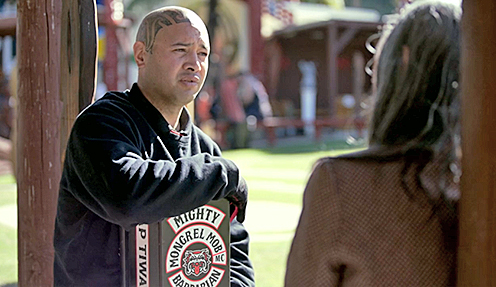‘Not all criminals wear patches’

ON SCREEN: Barbarians member Waha Allison tells documentary maker Kim Webby that not all criminals wear patches. Photo supplied
Contributed
- Kim Webby takes a closer look at Ōpōtiki gangs in her latest
documentary

GANGS. Bet that got your attention because stories on gangs tend to be among the most read, watched or listened to of all media stories.
Ōpōtiki is often the showcase town for gang issues, and I recently had the opportunity for a close-up look inside Ōpōtiki’s Barbarian chapter, when they attended a wānanga at Iramoko Marae in Manawahe. I made a documentary about the experience, which screened on Monday, on Te Ao with Moana, on Whakaata Māori (Māori Television).
The wānanga is part of an ongoing pro-social, pro-Māori effort by community, to re-connect the Barbarians with their Māori roots and their community. The mahi began with the Ōpōtiki Barbarian’s captain Steven (Tīwana) Taiatini, whose death is now the subject of murder charges. The work continues to be led by his wife and other community members.
The wānanga was funded by Toi Rāwhiti, a pan-tribal group of Whakatōhea, Ngāi Tai and Te Whānau a Apanui. The wānanga leaders were Iramoko Marae chairman Pouroto Ngaropo, Steven Taiatini’s widow Pauline Taiatini and Maraenui’s Kylie Poihipi.
Toi Rāwhiti project manager, Jodi Porter, notes that there are about 125 gang members in Ōpōtiki, so the wānanga is a powerful way to create change, for the members, their whānau and our community.
The wānanga took place during a government crackdown on gangs and the imminent ban on wearing gang patches in public. Ōpōtiki Barbarians stopped publicly wearing patches, even before the ban comes into force.
As member Waha Allison said in my documentary, “That’s what they (the government) feel they needed to do so that communities feel that they’re safe. Well, for three years we’ve got to just knuckle down, play the game.
“That’s not just for gangs, that’s for us as Te Ao Māori as well, because they’re attacking us as a people as well.”
When I asked what he thought a better way might be for governments (and others) to engage with gangs, his reply was, “Start looking at us as humans. Not all criminals wear patches, some of the sickest criminals don’t wear patches. They fly under the radar and they’re still out there on the streets.”
The wānanga included kōrero about identity and being proactively Māori, not only Mongrel Mob. There were sessions on mana wāhine and the role of men, sessions on waiata, learning pepehā, mau rākau, and a pure, or cleansing ritual.
In my view, the three days was powerful, sorely needed and deeply worthwhile, not just for the gang members but for their whānau and our community. No one expects instant change, or that the intergenerational problems of gang life, or that the results of Māori children being placed in state care that created gangs in the first place, will disappear overnight.
No one is that naïve.
As Mr Allison said, “I’m not going to sugar coat anything, we’re not going to be perfect after this, but at least the spark has been ignited. If we grow as men, as fathers, then we can grow our families as well, for our tamariki and for our partners too”.
Surely that is better than leaving a sore to fester, a sore created from the pain of colonisation, abuse in state care and years of simply increasing the size of prisons rather than dealing with the root causes of our problems.
The wānanga was not the beginning or the end of community and gang-led initiatives here in Ōpōtiki.
“It is part of an ongoing series of programmes created by locals for locals, designed to unpick the damage of the past.
The documentary is available to view on Te Ao with Moana, on Māori+, Whakaata Māori’s digital platform.
The morning after the documentary screened, members of the Barbarians and their whānau were caught up in nationwide police raids, led by the National Organised Crime group.
As the documentary maker, I had asked police via their national headquarters media department, for comment on the gang and their pro-social activities, and I enquired what criminal activity the gang might or might not be involved with. Police declined to comment. This was included in the documentary.